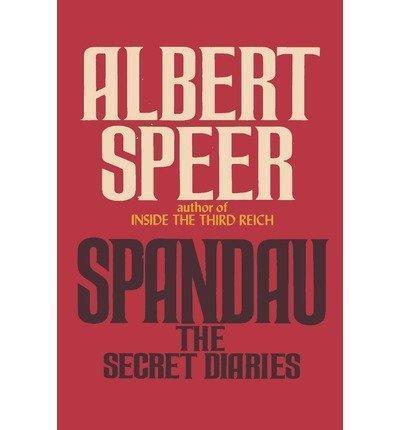Book Review: Spandau, The Secret Diaries
I just finished reading Spandau: The Secret Diaries by Albert Speer. A friend loaned the book to me long ago; she heard Marcel had been imprisoned in Spandau, and thought the book might be of interest.
Albert Speer was Hitler’s architect and eventually became Minister of Armaments and War Production. During the post-war Nuremberg trial, Speer denounced Hitler, took responsibility for the use of forced labor, and was sentenced to a 20-year prison term. Many other Nazi leaders, including Fritz Sauckel, General Plenipotentiary for Labour Deployment (that is, the man who was in charge of sending men like Marcel to Germany), were hanged.
Six other Nazi leaders were imprisoned in Spandau with Speer. They were called “The Spandau Seven.” The men were:
– Rudolf Hess, Hitler’s Deputy Führer (sentenced to life, died in prison at age 93)
– Naval Admiral Erich Raeder (sentenced to life, released early due to failing health)
– Naval Admiral Karl Dönitz (served 10 year sentence)
– Baldur von Schirach, head of the Hitler Youth (served 20 year sentence)
– Walther Funk, Reich Minister for Economic Affairs (sentenced to life, released early due to failing health) and
– Konstantin von Neurath, German Foreign minister who was involved in early territory expansion (sentenced to 15 years, released early)
Three questions were raised in the book’s introduction, which made the book seem like a timely read:
1. How was Adolph Hitler, an obvious madman, totally insane, able to attain and keep such great power.
2. Why did the German people not recognize what was happening and do something about it long before the destructive end?
3. Most importantly: Can this happen again? Could and will another Hitler arise, perhaps not in Germany? Perhaps in the United States of America? What assurance do we have that a lunatic madman could not enter the White House and do much worse that Hitler ever did?
While in Spandau, Speer was forbidden to have writing paper. Individual diary pages were smuggled out on tobacco paper, calendar pages, and toilet paper. Many pages captured the monotony of prison life, or described work in the prison garden, thoughts on architecture, or the guards (which alternated between US, UK, French, Soviet Union). Speer also wrote about his imagined travels. He carefully tallied the laps he walked around Spandau’s prison yard, amassing more than 31,000 kilometers in total. As each kilometer ticked by, he imagined himself walking from landmark to landmark or city to city across Europe, then the Mideast, the Asia, then across the Bering Strait, then south through the west coast of the United States.
A topic that came up year after year in diary entries was individuals’ relationship with Hitler. Some of the “Spandau Seven” were unflinchingly loyal to Hitler and the regime throughout the duration of their sentence. However, Speer (who, along with Baldur von Schirach, head of the Hitler Youth, were the only two to denounce Hitler during their trial) returned to the topic of Hitler again and again.
Speer seemed to want to understand his relationship with Hitler: Was it an attraction to power? His own ambition? Was he an unwitting or witting accomplice? As time passed, Speer also seemed to want to take an honest assessment of Hitler’s erratic behavior, his spellbinding control, and Hitler’s obsessions: building things, crowds, pageantry, hatred of Jews. Speer’s transparency and his quest for understanding was remarkable.
I want to share a few of Speer’s diary entries:
“Today I sometimes think that Hitler consciously tolerated or even deliberately promoted the corruption. It tied the corrupt men to him—doesn’t every potentate attempt to consolidate his rule by gestures of favoritism? … Authority, he thought, also needed outward show; the common man was impressed only by display. … How little Funk and I had ever grasped the cunning that underlay Hitler’s tactics in the exercise of power.” (pg112)
“Still on the question of loyalty. … Now that I am preoccupied with the matter, it suddenly seems to me that in the Third Reich I heard no word more frequently than ‘loyalty.’ It fell from everyone’s lips… But now I ask myself whether loyalty was no more than the rag we used to cover our moral nakedness; our lack of resolution, fear of responsibility, cowardice, all the vapidities that we bombastically called our ‘duty.’… Much too late I am beginning to grasp that there is only one valid kind of loyalty: toward morality.” (pg189)
“…he began moving the architecture and the massing of huge crows into the foreground, so that the enormous scenery of the ceremony became, so to speak, the ceremony itself.” (pg261)
“…I have gradually understood completely that the man I served was not a well-meaning tribune of the masses, not the rebuilder of German grandeur, and also not the failed conquerer of a vast European empire, but a pathological hater. The people who loved him, the German greatness he always talked about, the Reich he conjured up as a vision—all that ultimately meant nothing to him…. In the midst of an apocalyptic doom it attempted to commit us all to a miserable hatred of the Jews.” (pg 354)
“Today I was once again thinking how Hitler corrupted not only classicism, but everything he touched—a reverse King Midas, who transformed things not into gold but into corpses.” (pg370)
“And while images of burning cities, refugees on the roads, tank blockades, and dispersed army units rise before my mind’s eye, the figure of Hitler rises with them. A figure grown almost senile, bowed and speaking in a feeble voice; yet nevertheless the center of all that was happening. I have occasionally read that during these last weeks he went insane from fury, impotence, and despair over his wrecked plans; but that is wrong. Rather, at the time it was his entourage that seemed to me insane, or at any rate no longer wholly sane…. I think that all the apparently contradictory types of behavior, the commands to destroy everything and the commands to hold out, everything he did and said was directed with amazing consistency toward one single point: how he was going to figure in history.” (pg425-426)
“…I have considered how I would probably characterize Hitler today, after the passage of twenty years. I think I am now less sure that I ever was. All reflection magnifies the difficulties, makes him the more incomprehensible. Of course I have no doubts at all about the judgment of history. But I would not know how to describe the man himself. No doubt I could say that he was cruel, unjust, unapproachable, cold, capricious, self-pitying, and vulgar; and in fact he was all of those things. But at the same time he was also the exact opposite of almost all those things. He could be a solicitous paterfamilias, a generous superior, amiable, self-controlled, proud, and capable of enthusiasm for beauty and greatness. I can think of only two concepts that include all his character traits and that are the common denominator of all those many contradictory aspects: opaqueness and dishonesty. Today, in retrospect, I am completely uncertain when and where he was ever really himself, his image not distorted by playacting, tactical considerations, joy in lying. I could not even say what his feeling toward me actually was—whether he really liked me or merely thought how useful I could be to him. I don’t even know what he felt for Germany. Did he love this country even a little, or was it only an instrument for his plans?” (pg426-427)

